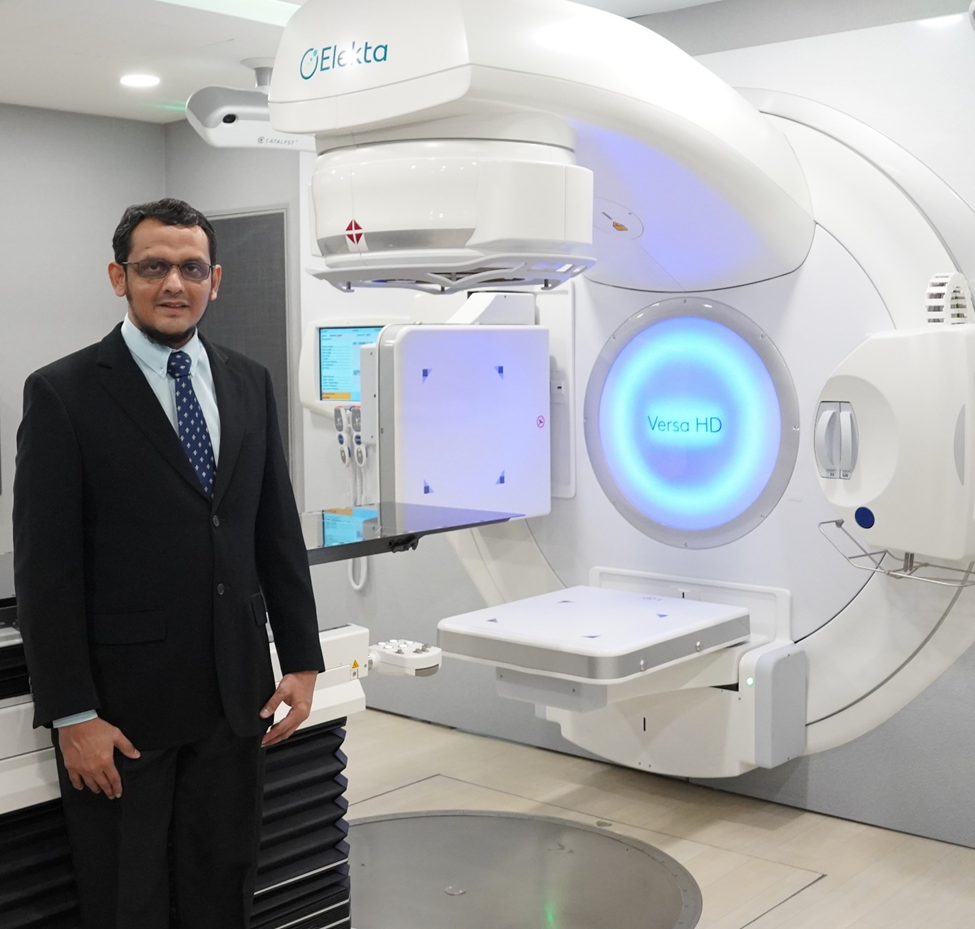Cancer is one of the leading causes of morbidity and mortality in Malaysia and worldwide. According to the Health Ministry’s Malaysia National Cancer Registry Report 2012–2016 released in 2020, people with lung and liver cancers had a five-year relative survival rate of only 11 and 12.8 percent, respectively.
On top of that, more people are being diagnosed late with cancer. The percentage of breast cancer cases detected in Stage 3 and 4 rose from 43.2 percent in the period of 2007 - 2011 to 47.9 percent in the period of 2012 to 2016.
This worrying trend is also similar for other common cancers like lung cancer, colorectal cancer, prostate cancer and uterine cervix cancer, where more patients are presenting at advanced late stage 4 disease.
When cancer care is delayed, there is a lower chance of survival, greater problems associated with treatment and higher costs of care. Early diagnosis improves cancer outcomes by providing care at the earliest possible stage and is therefore an important public health strategy in all settings.

In this interview, Dr Aminudin Rahman bin Mohd Mydin, Consultant Clinical & Radiation Oncologist at KPJ Damansara Specialist Hospital would be sharing his insights on early detection and prevention of cancer, new developments in cancer treatments and KPJ’s state of the art Elekta Versa HD Linear Accelerator radiotherapy system.
Malaysia’s homegrown KPJ Healthcare Berhad is the leading provider of private healthcare services in the country with an integrated network of more than 28 specialist hospitals located throughout the nation. The healthcare provider has four (4) Centre of Excellence for Cancer Care located at KPJ Damansara Specialist Hospital, KPJ Ampang Puteri Specialist Hospital, KPJ Johor Specialist Hospital and KPJ Ipoh Specialist Hospital with KPJ Sabah Specialist Hospital serves as their premier cancer care centre.
Is cancer a death sentence?
“Cancer is certainly not a death sentence. With today’s numerous developments in cancer diagnoses and treatments, many cancer patients are cured from cancer and have very good long term quality of life. One of the main issues we face in Malaysia is that there is not enough emphasis on early detection of cancer through cancer screening tests,” said Dr Aminudin.
He further mentioned that because of the COVID-19 cases for the past 2 years, cancer is very much neglected. Hence, it is important to bring back cancer to the mainstream and make the society aware that cancer is a major public health problem that needs to be focused on by government agencies, the private sector, NGOs and the whole of society.
Cancer Screening
Certain tests help find specific types of cancer before signs or symptoms appear. Each type of cancer has its own screening tests. Below are the few types of cancer screening:
Mammography: a type of Xray specifically designed to view the breast. The images produced by mammography can show cancers in the breast. Mammogram is recommended for women aged 40 years and above. On the other hand, breast ultrasound is a safer non-Xray alternative for younger women.
The Pap smear test: looks for precancers, cell changes on the cervix that might become cervical cancer If they are not treated properly. Together with the HPV test, they look for cervical cells infected with the high risk HPV viruses. This test is recommended for women who are sexually active starting in their 20s.
Colonoscopy: A colonoscopy is a way for a doctor to see the entire large intestine. Abnormal tissues such as polyps, and tissue samples (biopsies) can be removed through the scope during the exam. This procedure is a screening test for colorectal cancer and is recommended for people aged 50 and above.
PSA blood test: The PSA test is a blood test to help detect prostate cancer. The blood test measures the level of prostate-specific antigen (PSA) in your blood. PSA is a protein made only by the prostate gland. Along with Digital Rectal Examination (DRE) of the prostate gland, it is recommended for prostate cancer screening for men 50 years and above.
Low Dose Computed Tomography (LDCT) Scan of Lungs: This is a CT scan of the chest for lung cancer screening and it is recommended for current and former smokers 50 years and above.
Generally, cancer has long inspired fear among people, however it is essential to move past them and get screened. Screening exams can detect cancer early, when it’s easiest to treat. Staying on top of your recommended screenings may actually reduce fear in the long run.
Alternative cancer therapies and social media disinformation
Alternative therapies may be ineffective and may cause side effects. They might interfere with your conventional cancer treatment and may be harmful.
Individuals and companies who promote unproven, ineffective alternative therapies, especially through social media disinformation, can be dangerous by convincing people an alternative therapy will cure them when it can’t. This can be harmful if a person is also encouraged to give up their conventional cancer treatment. This is unfortunately, a very common problem in Malaysia, even amongst the young, educated and urban population.
Does COVID-19 impact cancer patients in any way?
“As we know COVID-19 can affect anyone regardless of age and background. Cancer patients with a weak immune system may be prone to the infection, so that is why we advocate cancer patients to go for vaccination under the Malaysian National COVID-19 Immunisation Programme (NIP) as soon as possible. This would effectively prevent them from getting the COVID-19 disease, and so that the disease would not affect their cancer treatments,” Dr Aminudin explained.
New developments and major breakthroughs in cancer treatments
1) New Advances in High-Technology Radiotherapy
Stereotactic radiosurgery (SRS) is a very precise form of therapeutic radiation that can be used to treat abnormalities in the brain and spine, including cancer, benign tumours, epilepsy, trigeminal neuralgia and arteriovenous malformations.
Stereotactic body radiation therapy (SBRT) is a cancer treatment that delivers extremely precise, very intense doses of radiation to cancer cells while minimising damage to healthy tissue. Commonly used for cancers of the lung, liver, pancreas and prostate.
Volumetric Modulated Arc Therapy (VMAT) uses photons (X-rays) generated by a medical linear accelerator. Very small beams with varying intensities are aimed at a tumour and then rotated 360 degrees around the patient. This results in attacking the target in a complete three-dimensional manner.
Four-Dimensional Image Guided Radiation Therapy (4D IGRT), also called respiratory gating, is a radiation treatment used to target tumours that move with a patient’s breathing such as lung, pancreatic and liver cancers. It also incorporates sophisticated imaging techniques during each treatment session.

Precision Medicine and Cancer Genomics in Cancer Treatment
Precision medicine uses next generation sequencing (NGS) to determine the genetics of cancer cells and from there, cancer treatments can be personalised with greater precision.
Targeted therapy is a type of cancer treatment that targets proteins that control how cancer cells grow, divide, and spread. It is the foundation of precision medicine in cancer treatment. There are numerous options of targeted therapy based on the genetic mutations of cancer cells. For example, breast cancer patients with the HER2 mutation have options like pertuzumab and trastuzumab. Lung cancer patients with the EGFR mutation can consider gefitinib, erlotinib or Osimertinib, an oral form of targeted therapy. Dr Aminudin shared that targeted therapy has fewer side effects, gives patients better quality of life and better survivability. This therapy can also be used to treat other cancers like kidney, colorectal and ovarian cancers.
Immunotherapy is the latest type of cancer treatment that enables the body to harness the pre-existing immune defences to recognise and attack the cancer cells. For example, pembrolizumab, an anti-PD-1 immunotherapy, removes the break put on by the cancer cells on the T-cells of the immune system through the PD-1/PD-L1 pathway. This allows the T-cells to recognise the cancer cells and destroy them. Immunotherapy has tremendously improved the outcomes for patients with difficult to treat cancers such as advanced lung cancer, melanoma (a very aggressive type of skin cancer) and kidney cancer. With immunotherapy for advanced stage 4 lung cancer, 1 in 3 patients may survive up to 5 years.
When it comes to your body, remember you’re in charge.
"If you've noticed any unusual symptoms that won’t go away, immediately speak to your doctor”. Don’t put it off. In most cases it won’t be cancer – but if it is, finding it early can make a real difference!
Equipped with the latest and most advanced facilities, KPJ is focused on delivering world-class quality healthcare services especially in cancer care. Visit https://kpjhealth.com.my/cancermonth to make an appointment with KPJ’s team of experienced specialists doctors and oncologists located nationwide.

